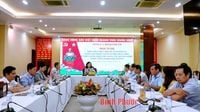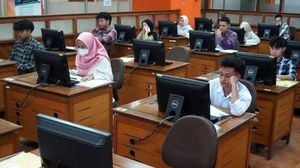On April 16, 2025, Huỳnh Thị Hằng, the Deputy Secretary of the Provincial Party Committee and Chairman of the Provincial People's Council, chaired a significant conference focused on implementing Project No. 09-ĐA/TU. This project, initiated on July 18, 2023, by the Provincial Standing Committee, aims to enhance the admission of Party members and the development of Party and mass organizations within enterprises located in industrial parks (IPs) and economic zones (EZs) throughout Bình Phước province for the period of 2023 to 2030.
Bình Phước province currently boasts 13 operational industrial parks, housing a total of 238 enterprises that employ approximately 84,400 workers. Additionally, the Hoa Lư Border Gate Economic Zone is home to 36 enterprises, employing around 300 individuals, primarily seasonal workers. This context sets the stage for the ambitious objectives outlined in Project No. 09.
During the conference, Nguyễn Trung Dũng, the Deputy Head of the Provincial Party Organization Department, presented a draft report detailing the progress of Project No. 09 during the first quarter of 2025, along with the plans and tasks for the second quarter. As of now, Bình Phước has established 59 Party organizations within private economic units, totaling 405 Party members. This includes one grassroots Party committee, 37 grassroots Party cells, and 21 Party cells that are directly under the commune, ward, and town Party committees. Notably, there are four Party organizations located within enterprises in industrial parks.
In the first quarter of this year, one Party member was successfully admitted from the Minh Hưng - Hàn Quốc Industrial Park. Currently, there are seven enterprises that have expressed their willingness to establish Party organizations, with five of these meeting the necessary criteria for establishment.
Furthermore, the province has made strides in union organization, with a total of 1,361 trade union organizations comprising 83,476 members in private economic units. This includes 29 union branches with 832 members and 24 associations with 282 members. The meeting provided a platform for members of the Steering Committee to discuss challenges faced in developing Party organizations and establishing grassroots cells, as well as the identification and nurturing of potential Party members within enterprises.
Huỳnh Thị Hằng emphasized the importance of adhering to the guidelines and tasks set forth by the Steering Committee for 2025. She instructed various agencies and units to closely follow the proposed objectives and plans. A key directive was for the Provincial People's Committee to collaborate with relevant agencies to develop training programs for new Party members, a proposal that has already received approval from the Provincial Standing Committee.
Additionally, Hằng urged the Steering Committee members to remain vigilant and proactive in monitoring the situation, ensuring that all agencies and units implement the project effectively. She called for suggestions to overcome any difficulties encountered during the implementation phase.
In a related development, on April 17, 2025, at a press conference addressing the socio-economic situation in Ho Chi Minh City, Võ Ngọc Quốc Thuận, the Director of the Department of Home Affairs, announced the support measures for non-specialized staff who will be leaving their positions following the restructuring of wards and communes within the city.
Currently, Ho Chi Minh City employs 5,562 non-specialized staff across 273 wards, communes, and towns. The support policy for these individuals who resign is guided by Decree 29/2023, which focuses on streamlining personnel, as well as Resolution 50/2024 from the Ho Chi Minh City People's Council, which provides additional support for those resigning due to staff reductions.
As part of the restructuring process, the use of non-specialized staff at the ward and commune levels will be discontinued. Local authorities are tasked with evaluating and potentially reallocating these non-specialized personnel to ensure they meet the requirements for participation in community service at the village or neighborhood level.
Thuận highlighted the importance of this transition, stating that the local government is committed to facilitating job placements for non-specialized staff who are affected by these changes. The initiative aims to ensure a smooth transition for those impacted by the restructuring, thereby maintaining stability within the local workforce.
In conclusion, both Bình Phước and Ho Chi Minh City are actively engaged in initiatives aimed at enhancing organizational structures within their respective regions. By promoting Party membership and supporting non-specialized staff during transitions, these local governments are striving to foster a more organized and efficient administrative framework that aligns with broader national objectives.





